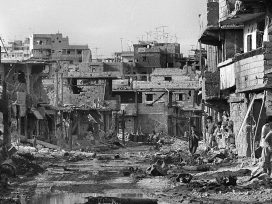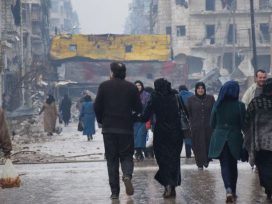Abstracts Esprit 10/2005
Pierre Vidal-Naquet
Esprit‘s past: That was then
The French historian shares with us his surprise as he read through the recently re-published war-time editions of this periodical. Although he recoils at the thought of publication continuing under Nazi occupation, he shows how this can be re-considered in light of those peculiar circumstances.
Pierre Hassner
The international order and its ambiguities
How are we to understand the ongoing realignment of the international system? What role if any do governments retain? Can we steer away from sheer power plays? Despite the tragic nature of many situations, some ongoing, inconsistent trends can be highlighted that have little to do with such well-rehearsed antagonisms as power vs. law, or domination vs. regulation.
Cédric Philibert
Beyond the Kyoto Protocol
As climate change moves to front-page news and elicits increasingly gloomy forecasts, the Kyoto Protocol on greenhouse gas emissions and its ongoing implementation look like only a preliminary step. To what extent do we want to keep or dismantle it as we anticipate the vagaries of tomorrow’s climate?
Jean-Pierre Lavaud
Bolivian fever
The street demonstrations and road blockages that have brought Bolivia to a halt have little to do with conventional poor or “voiceless” people’s campaigns; rather, they highlight the decay of a political system and its inability to resist exacerbated corporatist claims.
Olivier Remaud
The architect’s craft and the art of building. Reading Alberti today
Following its recent translation and publication, Alberti’s 1452 treatise on architecture stands out as one of the two founding pillars of urban planning theory in Europe, along with Thomas More’s own Utopia (1516). With his respect for the physical dimension and his drive to constitute humanity through construction and without any gap between the public and private spheres, Alberti’s book resonates with our own contemporary concerns.
Françoise Choay
The driving forces of European urban planning: From Alberti and More to Giovannoni and Magnaghi. An interview
Unlike other scholars concerned with the history of European urban planning, Françoise Choay manages to measure up physical architecture against founding treatises, including not just Alberti and More but also Haussmann, Cerdá, Le Corbusier, and, closer to us, Gustavo Giovannoni and Alberto Magnaghi.
Françoise Choay
Utopia and the anthropological status of constructed space
Underneath the history of urban planning lie More’s designs for a utopian city and the idea that a specific construction model could become universal. At the same time, it may be one-sided to consider Le Corbusier’s ideal city as an offshoot of More’s own utopian city. In this contribution, Choay suggests that we take another look at contemporary utopian projects, for which Magnaghi’s local project stands as an apt symbol.
Olivier Mongin
“From class struggle to place struggle”. Alberto Magnaghi’s “local project” and Bernardo Secchi’s renovatio urbanis
The phrase “place struggle” serves to highlight the fact that, in post-industrial societies, conflicts are more and more related to recovery of democratic space and polities. In a post-urban world where global technical flows devour conventional urban space, globalization must be tackled “bottom up”. Magnaghi’s and Secchi’s Italian experiments anticipate this need.
Josep Ramoneda
An urban-focused cultural centre. Barcelona’s experience. An interview
A symbol par excellence of the European city, Barcelona has opened a centre that catalyzes exhibitions, activities, scholarship, and disciplines (artistic or otherwise) that all have the city as their theme. This goes to show that the urban theme is one of the driving forces of cultural life.
Jacques Donzelot
A policy for the city
Rather than an urban policy – a fantasized territory under the state’s homogenizing control – we should envisage policies for the city, which would strive to highlight its attractions and mechanics. The primary purport of such policies is to set the population in motion again, to empower them and to achieve some sort of unified urban polity.
Published 18 October 2005
Original in French
Contributed by Esprit © Esprit
PDF/PRINTNewsletter
Subscribe to know what’s worth thinking about.



